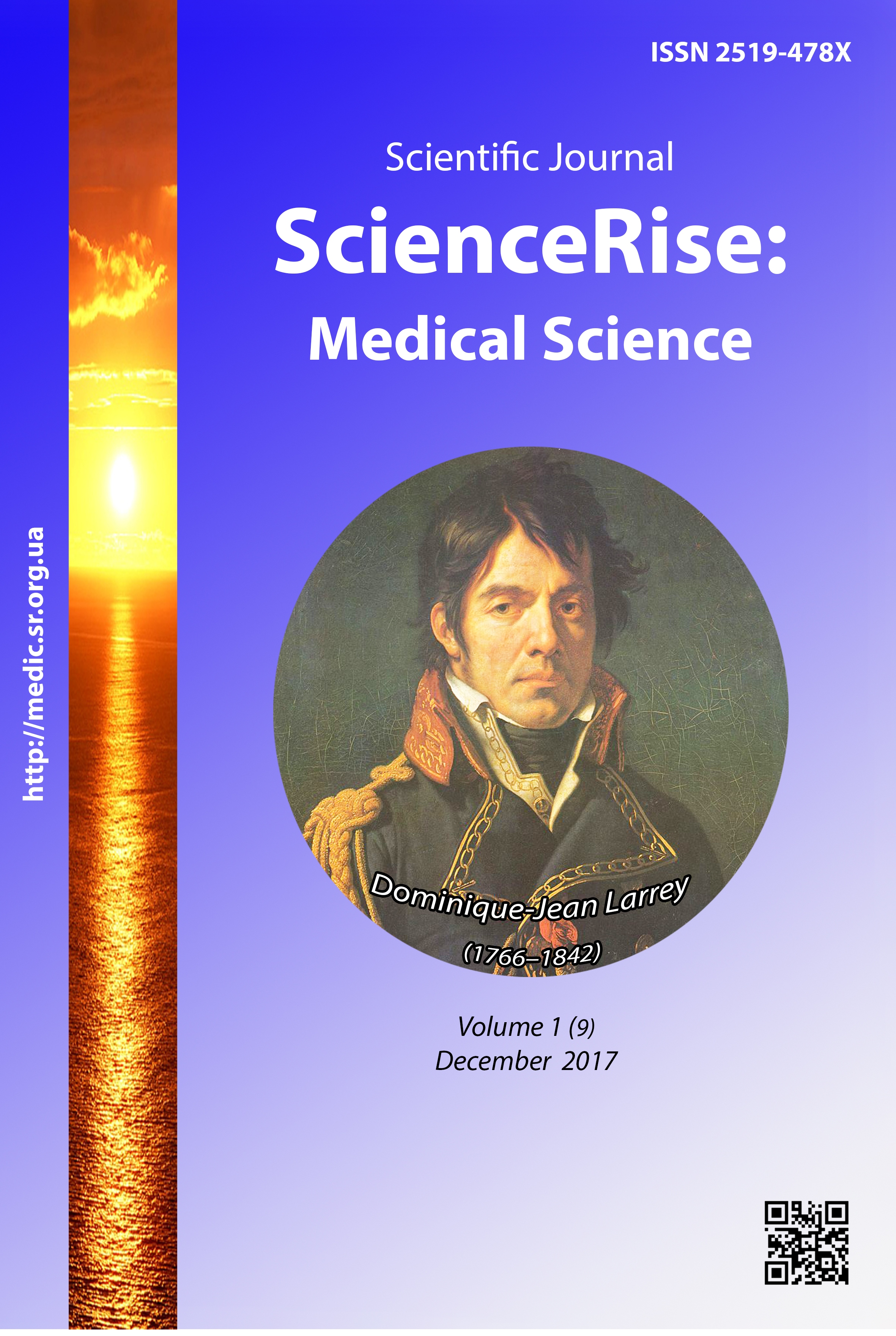Phenotypic features of generated dendritic cells in patients with pancreatic cancer immunotherapy
DOI:
https://doi.org/10.15587/2519-4798.2017.90950Keywords:
pancreatic cancer, immunotherapy, anticancer vaccines, dendritic cells, phenotypic featuresAbstract
Aim. The aim of our research was to study quantitative and phenotypic features of dendritic cells (DC) from peripheral blood monocytes for immunotherapy in patients with pancreatic cancer (PC).
Materials and methods. DC were used as natural adjuvants in the composition of anticancer vaccines in complex treatment of PC patients. DC phenotypic maturity was estimated using flow cytofluorometry.
Results and discussion. The analysis of DC quantity and vitality has shown that in all PC patients it managed to grow a sufficient number of viable DC for immunotherapy. The expression level of CD83, CD86 и HLA-DR differentiation antigens on DC generated in vitro significantly increased during immunotherapy in PC patients.
Conclusion. The obtained data can be put into the basis for development of the protocols of DC use as natural adjuvants in the composition of anticancer vaccines in the standard schemes of PC patients’ treatmentReferences
- Ryan, D. P., Hong, T. S., Bardeesy, N. (2014). Pancreatic Adenocarcinoma. New England Journal of Medicine, 371 (11), 1039–1049. doi: 10.1056/nejmra1404198
- Kirkwood, J. M., Butterfield, L. H., Tarhini, A. A., Zarour, H., Kalinski, P., Ferrone, S. (2012). Immunotherapy of cancer in 2012. CA: A Cancer Journal for Clinicians, 62 (5), 309–335. doi: 10.3322/caac.20132
- Sabado, R., Bhardwaj, N. (2015). Cancer immunotherapy: Dendritic-cell vaccines on the move. Nature, 519 (7543), 300–301. doi: 10.1038/nature14211
- Dhodapkar, M. V., Steinman, R. M., Krasovsky, J., Munz, C., Bhardwaj, N. (2001). Antigen-Specific Inhibition of Effector T Cell Function in Humans after Injection of Immature Dendritic Cells. The Journal of Experimental Medicine, 193 (2), 233–238. doi: 10.1084/jem.193.2.233
- Figdor, C. G., de Vries, I. J. M., Lesterhuis, W. J., Melief, C. J. M. (2004). Dendritic cell immunotherapy: mapping the way. Nature Medicine, 10 (5), 475–480. doi: 10.1038/nm1039
- Palucka, K., Banchereau, J. (2012). Cancer immunotherapy via dendritic cells. Nature Reviews Cancer, 12 (4), 265–277. doi: 10.1038/nrc3258
- Hettihewa, L. (2011). Prolonged expression of MHC class I – peptide expression in bone marrow derived retrovirus transfected matured dendritic cells by continuous centrifugation in the presence of IL-4. The Indian Journal of Medical Research, 134 (5), 672–678. doi: 10.4103/0971-5916.90993
- Dudek, A. M., Martin, S., Garg, A. D., Agostinis, P. (2013). Immature, Semi-Mature, and Fully Mature Dendritic Cells: Toward a DC-Cancer Cells Interface That Augments Anticancer Immunity. Frontiers in Immunology, 4, 438–452. doi: 10.3389/fimmu.2013.00438
- Richter, C., Thieme, S., Bandoła, J., Laugsch, M., Anastassiadis, K., Brenner, S. (2013). Generation of Inducible Immortalized Dendritic Cells with Proper Immune Function In Vitro and In Vivo. PLoS ONE, 8 (4), e62621. doi: 10.1371/journal.pone.0062621
- Anguille, S., Smits, E. L., Bryant, C., Van Acker, H. H., Goossens, H., Lion, E. et. al. (2015). Dendritic Cells as Pharmacological Tools for Cancer Immunotherapy. Pharmacological Reviews, 67 (4), 731–753. doi: 10.1124/pr.114.009456
- Amigorena, S., Savina, A. (2010). Intracellular mechanisms of antigen cross presentation in dendritic cells. Current Opinion in Immunology, 22 (1), 109–117. doi: 10.1016/j.coi.2010.01.022
- Kantoff, P. W., Higano, C. S., Shore, N. D., Berger, E. R., Small, E. J., Penson, D. F. et. al. (2010). Sipuleucel-T Immunotherapy for Castration-Resistant Prostate Cancer. New England Journal of Medicine, 363 (5), 411–422. doi: 10.1056/nejmoa1001294
- Johnson, L. A., Jackson, D. G. (2008). Cell Traffic and the Lymphatic Endothelium. Annals of the New York Academy of Sciences, 1131 (1), 119–133. doi: 10.1196/annals.1413.011
- Hranovskaja, N. N., Krjachok, I. A., Ganul, V. L., Vorob'eva, L. I., Grinevich, Ju. A., Orel, V. Je., Skachkova, O. V. et. al. (2014). Razrabotka, obosnovanie i ocenka jeffektivnosti protivoopuholevoj vakcinoterapii na osnove dendritnyh kletok u bol'nyh so zlokachestvennymi novoobrazovanijami. Klinicheskaja onkologija, 2 (14), 62–70.
- Okamoto, M. (2016). Dendritic cell-based vaccine for pancreatic cancer in Japan. World Journal of Gastrointestinal Pharmacology and Therapeutics, 7 (1), 133–138. doi: 10.4292/wjgpt.v7.i1.133
Downloads
Published
How to Cite
Issue
Section
License
Copyright (c) 2017 Наталья Николаевна Храновская, Оксана Владимировна Скачкова, Сергей Владимирович Земсков

This work is licensed under a Creative Commons Attribution 4.0 International License.
Our journal abides by the Creative Commons CC BY copyright rights and permissions for open access journals.
Authors, who are published in this journal, agree to the following conditions:
1. The authors reserve the right to authorship of the work and pass the first publication right of this work to the journal under the terms of a Creative Commons CC BY, which allows others to freely distribute the published research with the obligatory reference to the authors of the original work and the first publication of the work in this journal.
2. The authors have the right to conclude separate supplement agreements that relate to non-exclusive work distribution in the form in which it has been published by the journal (for example, to upload the work to the online storage of the journal or publish it as part of a monograph), provided that the reference to the first publication of the work in this journal is included.









